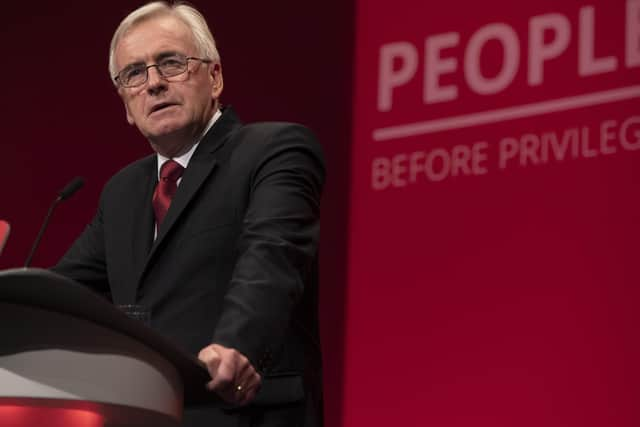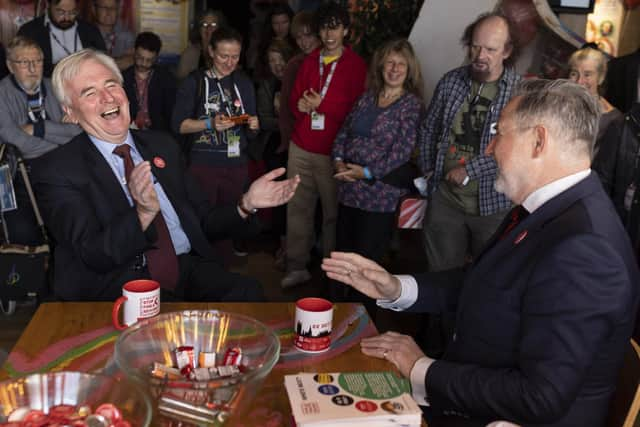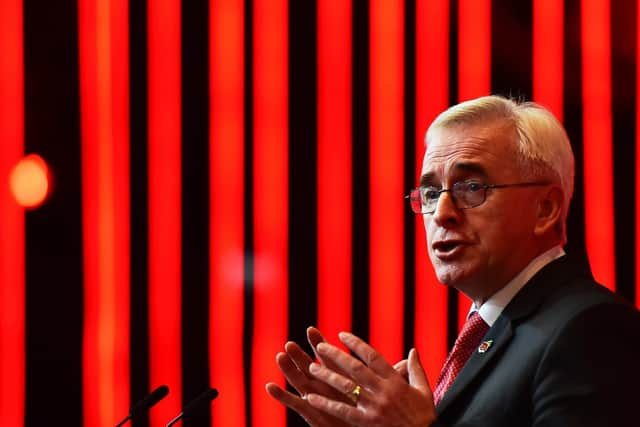John McDonnell: Labour can learn from my mistakes - and Joe Biden's party unity - to win next election
In the dark days for Labour of December 2019 when the party suffered its worst election result since 1935, the-then Shadow Chancellor John McDonnell said the party’s “catastrophic” defeat was on him.
“I own this disaster,” said Jeremy Corbyn’s right-hand man in an interview with Andrew Marr. “If anyone is to blame, it is me.”
Advertisement
Hide AdAdvertisement
Hide AdIt is perhaps little surprise that Sir Keir Starmer has opted to take the party in a different direction towards the centre ground given the outcome of the last election – with the division between the party’s new course and its previous socialist leadership most clearly symbolised by the ongoing suspension of the Labour whip from Mr Corbyn over his reaction to a highly critical report on anti-Semitism under his leadership.


Sir Keir was repeatedly heckled during his recent party conference speech after pushing through rule changes that give MPs a greater say over choosing future leaders, making it harder for left-wing candidates to succeed.
It is perhaps telling of the internal party tensions that Mr McDonnell has taken it upon himself to put forward a pre-Budget proposal to introduce a regional version of the Barnett Formula used by the Government to give grants to Scotland, Wales and Northern Ireland – a move he suggests could ‘level back’ the nation by helping to redress the huge losses in central government funding to local councils.
The figure for Yorkshire and Humber alone is £804m less per year in 2021/22 compared to 2015/16.
Advertisement
Hide AdAdvertisement
Hide AdWhen asked by The Yorkshire Post if Sir Keir and his replacement as Shadow Chancellor, Rachel Reeves, were aware he was putting forward the proposal, Mr McDonnell says: “I’ve taken this upon myself because it is an idea I have been arguing for a number of years.”


His intervention comes just days after fellow Labour left-winger Jon Trickett published a 75-page report arguing for the introduction of a wealth tax – an idea pointedly backed by Mr McDonnell, as well as Mr Corbyn and other high-profile members of the previous Shadow Cabinet such as Rebecca Long-Bailey and Diane Abbott.
What Joe Biden and Bernie Sanders can teach Labour
But Mr McDonnell insists he is hopeful that the Labour Party can become a united force before the next election – and urged Sir Keir to take a leaf out of Joe Biden’s book after the President’s work alongside American left-winger Bernie Sanders.
“Keir promised two things: firstly to unite the party. Secondly, he published a programme which was largely based on a lot of the ideas that we had,” he says.
Advertisement
Hide AdAdvertisement
Hide Ad

“Two things have happened. The party has not been united and the broad church approach that we wanted, he doesn’t seem to be pursuing as well as we would want it.
“Then secondly, some of the ideas that he stood upon when he was elected leader, he’s moved away from.
“The point I’ve been trying to make consistently to Keir or anyone else around him is actually the best thing to do is unite the party and look at what Biden is doing.
“Biden listens to everybody, he’ll make sure he has a discussion with all wings of his party and in that way, they’ve held together pretty well.
Advertisement
Hide AdAdvertisement
Hide Ad“That’s the way they defeated Trump – it was all those youngsters mobilising that voted for Biden. There is a lesson to be learned from the way Joe Biden has gone about some of these basic elements of economic policy in particular.”
'We stand a good chance of winning the next election'
Mr McDonnell says he feels that message is yet to be heeded.
“I was hoping the Labour Party conference would be the point that Keir would demonstrate a united party, a vision of a society for the future and some elements of a policy programme that we could campaign for.
“There is a lesson to be learnt from the December 2019 election. We tried to throw out as many policies as possible to excite people and what happened was – and this was my mistake – was that there were so many policies coming out that people liked individually but together they didn’t believe you could implement that sort of scale of programme.
Advertisement
Hide AdAdvertisement
Hide Ad“The lesson with that is with a new policy you need about 12 months to bed it in. You announce it, then you rebut the criticisms that inevitably come from your opponents and then you start bedding it in by explaining what it will be for people. Over 12 months you’ll stand a good chance then of demonstrating how that particular policy fits in with the vision of the society you want to create.
“We could enter a general election in 18 months. So you haven’t got long to get those policies out there.
“Unfortunately, the conference wasn’t that. It was all constitutional changes, and I just thought that was a complete diversion of our attention, unnecessarily so. What’s needed is clarity from the party leadership on the sort of society that we want to create.
“I think we stand a good chance of winning the next election, but if it’s still on arguing about the niceties and fine detail of the Labour constitutional rulebook, it looks like a divided party and people will not vote for a divided party."
Advertisement
Hide AdAdvertisement
Hide AdHe says he is keen that the party learns from the mistakes he made at the 2019 general election - particularly in regard to the introduction of an overly-wide array of policies in the weeks before the vote.
Mr McDonnell says that after coming very close to Government in 2017, in the run-up to the 2019 election, “we didn’t have a strong enough narrative developed back about the sort of society we wanted to create, how we would do it, and what the key messages were around that.”
He says the Labour party’s internal divisions on how to approach Brexit played a part in their defeat after going into the election arguing for another referendum, but says it was far from the only factor at play.
“Leave aside Brexit, the strong lesson to be learnt is the development of clear narrative for the two years in advance of that. That is why I’m trying to shake the Labour party and say, you need to do that now - please learn that lesson.
Advertisement
Hide AdAdvertisement
Hide Ad"I took the hit for the General Election campaign as I was part of the leadership. Sometimes people say you shouldn’t listen to those that have lost, but actually people who lose in those fights are the ones who learn the lessons thoroughly.
“That is one of the lessons I’ve tried to get across. It doesn’t seem to have been learnt at the moment.”
What Tony Blair and Gordon Brown got right
John McDonnell says he is looking forward to binge-watching the recent BBC documentary on Tony Blair and Gordon Brown - and admits there were positives from the New Labour years.
Mr McDonnell, who became an MP in 1997 but frequently voted against the Government on issues like the Iraq war and tuition fees, says: “The Labour Government did some fantastic things and I supported the investment it made.
Advertisement
Hide AdAdvertisement
Hide Ad"Blair was right on ‘education, education, education’ - the investment was fantastic. But then things got tarnished.
"The Tories closed a school in my constituency and we occupied it to stop them selling off the land. Labour came into power and fantastically said we are going to reopen and rebuild the school and we did but then they forced a PFI on us and it was just crushing in terms of the financial cost.
“They were lots of great things but also some key mistakes that were made and of course then Iraq happened.”
“I’ve always been fair about this. In terms of investment needs and the scale of education, [Blair] was right on that but the way in which some of it was done I was really disappointed by. I have nothing for admiration for the way in which Gordon Brown targeted child poverty and he lifted children in my constituency out of a life of poverty. Fantastic.
Advertisement
Hide AdAdvertisement
Hide Ad"Do I wish he had gone further? Of course I do. I wanted more redistribution of wealth in this country and I think we should have had more control of the banks. I was calling for public ownership.
“There was lots of good things but the Iraq war was such a disaster and the way we went into it was disgraceful.
“The two things that really got to me were that war and tuition fees. Education is a gift from one generation to another, it is not a commodity to be bought and sold and that is what tuition fees did. That allowed the Tories to come in and triple them and a lot of younger people have been hit very hard by that.
“My son and others are now coming out with £50,000 to £60,000 of debt. I’m sorry if it sounds arrogant but I did say from the get-go, this system isn’t going to work economically because there wouldn’t be enough paid back. What’s happened now to try and save the system, they whack interest rates up and they have to write most of it off because it is not being paid back, people can’t afford it.
Advertisement
Hide AdAdvertisement
Hide Ad“I think the best way forward is to scrap them altogether and pay for education in the normal way through general taxation.”
McDonnell's feelings about Marxism
In a 2019 interview with Alastair Campbell for GQ, Mr McDonnell said he would rate himself as nine out of ten on a left-wing scale and there has been persistent debate about whether he would class himself as a Marxist.
When asked if that is the case, he replies: “As soon as you get into that, are you a Marxist or not, you are completely missing the point. I keep saying to people, if you haven’t read Marx you do not understand the capitalist economy.
“When the banking crash happened in 2008, one of our books that was so popularly on sale was Kapital by Karl Marx, because actually it does give a good analytical description of the operation of capitalism and how it works. Simple as that. So I’m saying to people, one, don’t blame Marx for some of the regimes that came out of it that call themselves Marxists - that’s like blaming Jesus Christ for what happened in the Spanish Inquisition. The whole point is don’t close yourself down to reading that tradition of economic and political analysis.
Advertisement
Hide AdAdvertisement
Hide Ad“There’s a long tradition in this country of socialist thinkers and people need to wake up to them a bit more because you learn the lessons of history in that way and it does give you ideas about the sort of future society that we want to create.
“I always say that I’m a socialist, and you’ve got to include that tradition of a vast range of socialists. I just want to wake people up to the fact that in this country we have had immense socialist thinkers going back 800 years - a lot of them almost written out of history.”
Support The Yorkshire Post and become a subscriber today. Your subscription will help us to continue to bring quality news to the people of Yorkshire. In return, you'll see fewer ads on site, get free access to our app and receive exclusive members-only offers. Click here to subscribe.